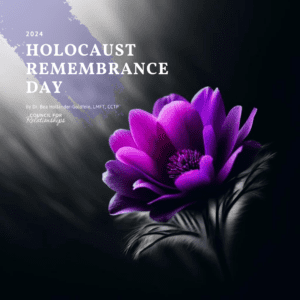Holocaust Remembrance Day 2024 – Yom HaShoah
 Holocaust Remembrance Day 2024 in Context of October 7th
Holocaust Remembrance Day 2024 in Context of October 7th
It has been 79 years since the end of WWII.
The term Holocaust has appeared in the daily press more frequently since the Hamas attack on Israel on October 7, 2023, than at any other time since the end of WWII. Why is this striking? Because of the reality that the largest attack on Jews since the end of the Holocaust took place on October 7 (a fact that is often repeated by media when covering the Israel-Hamas War).
What do we do with this fact? How do we feel? How does it affect our consciousness?
It has been believed that the memorialization of the Holocaust through an international day of observance established by the United Nations, through museums, memorial events, and Holocaust survivor testimonies, and through the educational curricula in schools and universities would sensitize humanity to the reality of humanity’s cruelty to others.
The phrase “never again” captures this sentiment. But have we learned? What have we learned? There have been a number of genocidal wars since the end of WWII. Many countries around the world have dictatorial regimes and oppressed groups within their populations.
So what does it mean to commemorate Holocaust Remembrance Day in 2024?
We owe it to the 6 million people destroyed by the Nazi goal to exterminate the Jews not only to mark their deaths but also to remember their lives and their stories. We acknowledge this overwhelming tragedy and bear witness to human cruelty that causes enormous human suffering.
Going to Holocaust museums can cause deep feelings of sadness, despair, and empathy for those who suffered. Alongside the sense of disbelief and an out-of-body experience that feels surreal, hopefully, comes a personal commitment to never let this happen again.
Yom HaShoah
This Yom HaShoah, on May 6, 2024, should be a wake-up call. We need to do more than bear witness and feel sad. This year, of all years, we should make a personal commitment to take a stand against hatred in all forms.
Look around you. You do not even have to go global. We need to examine our own communities, workspaces, and rhetoric within our own country.
Do we believe in democracy? Do we believe in equality? Do we believe in the value of every human being?
Well, if you do, then take a stand against those around you who espouse hatred, blanket condemnation of one group over another, and the determination of who is acceptable and who is not. Take a stand against tyranny in whatever form you see it. We need to respond against all the “isms” that arise in a time of social unrest or social confusion.
In addition to working towards the end of racism and bigotry, we must speak out against the significant rise of antisemitism in the United States. Who stands with me?
I share with you the statement by German Lutheran pastor Martin Neimoller – an opponent of the Nazi Regime:
First, they came for the socialists, and I did not speak out—because I was not a socialist.
Then they came for the trade unionists, and I did not speak out—because I was not a trade unionist.
Then they came for the Jews, and I did not speak out—because I was not a Jew.
Then they came for me—and there was no one left to speak for me.
From Holocaust Remembrance Day 2024 to the Transcending Trauma Project
Since its establishment in 1991, the Transcending Trauma Project (TTP) has delved deeply into the complexities of human resilience and anguish, examining the lives of Holocaust survivors and their families. This Council for Relationships project has amassed over 1,200 hours of interviews with 97 survivors, capturing the narratives of their lives and those of their children and grandchildren. These archives are now preserved at the U.S. Holocaust Memorial Museum.
TTP’s unique approach to examining the intricate pre-war, wartime, and post-war family dynamics offers insights into the mechanisms of coping and adaptation.
The research on how people deal with and adapt to severe trauma, like the TTP studies, is important for other groups who have also experienced extreme trauma, whether it happened during attempts to wipe them out, wars, battles, or violence against them personally.
So far, the project has produced two books and many articles that show how trauma affects families over generations, impacting how families connect and how strong individuals can be. These insights are crucial for therapists and practitioners seeking effective ways to support traumatized individuals, emphasizing the importance of understanding family interactions in the healing process.
Through collaboration with experts from various institutions in Philadelphia, TTP enhances our comprehension of trauma’s extensive reach and the pathways to recovery. It serves to guide our efforts to mitigate the impacts of past atrocities on future generations and underscores the pivotal role of empathy and detailed study in fostering thriving relationships and flourishing communities.

Dr. Bea Hollander-Goldfein, Director of the Transcending Trauma Project
About the Author
Bea Hollander-Goldfein, PhD, LMFT, CCTP, Director of Transcending Trauma Project at Council for Relationships. She is a licensed psychologist and Marriage and Family Therapist (MFT) and an instructor and supervisor in CFR’s AAMFT-accredited Postgraduate Program in MFT. Dr. Hollander-Goldfein has a broad-based clinical practice with expertise in trauma treatment.
Let CFR’s over 85 individual, couples, and family therapy experts help you build thriving relationships and flourishing communities. See our Therapist & Psychiatrist Directory for CFR therapists or psychiatrists near you.
If this is an emergency, please call 911 or contact the National Suicide Prevention Lifeline by dialing 988.
More Expert Mental Health Blogs from CFR
If you enjoyed “Holocaust Remembrance Day 2024 – Yom HaShoah,” our expert therapists, psychologists, and psychiatrists offer much more to explore! Check out the CFR Expert Voices blog for great mental and emotional health advice and insight. To get first access to our Expert Voices blog, join our mailing list!
Purim and Mental Health: What the Holiday Can Teach Us about Ourselves
